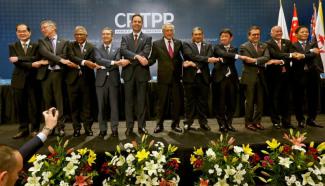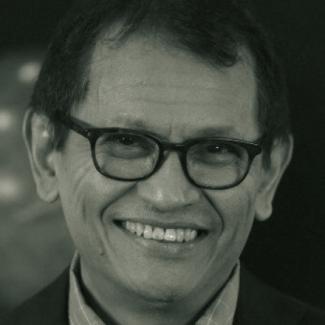Global trade
“I do not know whether the WTO will survive”

Why is unpredictability a problem in global trade?
- First of all, the patterns of trade that we have today are very different from what we had 30 years ago. Everybody now depends on everybody else because of complex supply chains. In the past, international trade was basically made up of commodities and finished goods. Today, intermediate goods matter very much.
- Second, we should consider why this change happened. The reason is that everybody tried to become more productive and more efficient. The new patterns of trade thereof reflect comparative advantages.
- Third, there are no victims and perpetrators in trade. If there is a trade deficit, both partners are responsible. Tariffs, moreover, hurt both sides. It is mindboggling that Trump should think he can somehow “win” the game by imposing tariffs.
- Fourth, we should not only consider trade, but finance too. One reason the USA has a trade deficit is that its huge budget deficits have allowed the USA to consume more than it produces. Its people and companies are spending more than their income on goods and services, from both the USA and abroad. The resulting savings-investment led to the trade deficit, and it includes government debt. The tax cuts that Trump’s Republican Party has recently passed in Congress will compound the problem, allowing Americans to spend yet more money, which means they are likely to import more, not less.
- Fifth, both trade restrictions and government debt mean that inflation is set to rise, and that is likely to make the Federal Reserve raise interest rates in the USA. Higher interest rates, however, will hurt the corporate sector, not least in emerging markets and developing countries. Private-sector companies everywhere have grown used to cheap money and many have assumed considerable debts. Rising interest rates mean that the cost of credit will rise, and that will be like a break on investment.
- Finally, after World War II, increasing trade was always seen as a way to entrench peace. If countries cooperate closely and depend on one another, warfare becomes less likely. If globalised trade is certainly a disincentive against military war, a trade war can make military war more likely.
So who would suffer in a trade war?
Everyone would suffer. Germany will feel great pain because your economy particularly depends on exports including exports of German-made products produced in China destined for the US and other countries. The USA will suffer too. China has announced it will raise tariffs on agricultural imports from the USA, so farmers, many of whom voted for Trump, will be hit. At the same time, US manufacturers will have to pay more for components they need, and consumer goods will get more expensive.
How would emerging markets and developing countries be affected?
In several ways. Of course, all companies that are part of supply chains would clearly feel some kind of impact. But that is not all. The investment goods that emerging markets and developing countries import would become more expensive, yet many industries including exporting ones in these countries depend on imported components, and this problem would be compounded once interest rates start to rise. In recent years, money was cheap and flowed to Asian, African and Latin American countries, so capital for expanding production capacities was cheap. Monetary policy has been loose in the USA and the EU, and cheap capital was invested in other countries where returns were higher. If those capital flows dry up now and then go into reverse, growth will slow down. Early alarm signals are flashing, and we saw the first as early as 2013. Back then, Ben Bernanke was the chairman of the Federal Reserve, and he stated that monetary policy would be normalised. The financial markets of emerging markets reacted frantically even though interest rates in the US had not even changed. At the same time, higher interest rates in rich countries can reduce foreign direct investments in poorer ones.
Can and will the multilateral World Trade Organization (WTO) survive the current turmoil?
You are raising two different questions. Yes, the WTO can survive, but I do not know whether it will. Tensions can be resolved in several ways. The USA might turn to the WTO dispute-settlement system. It might also strike a deal with China in bilateral talks, or perhaps some kind of multilateral debate will lead to solutions. But whether any of that will happen is impossible to say in this era of unpredictability. Not least, the impasse in the appointment of Appellate Body members can adversely affect the credibility and functioning of the WTO.
Can bilateral trade agreements serve as a cushion if the WTO is eroded?
Well, we are living in a second best world. The best world is the WTO. It makes sense to have global rules that apply to all parties and facilitate trade. Bilateral deals make things more complicated. The reason bilateral deals and free-trade agreements have proliferated is that the WTO has not been moving ahead for a long time. The Doha Development Round of negotiations was launched in 2001, and it has not been concluded. On the up-side, however, the various free trade agreements are likely to defend the WTO in view of a looming trade war.
In March, 11 countries concluded what they now call the Comprehensive and Progressive Agreement for Trans-Pacific Partnership (TPP) without the USA. Why did that happen? We were told for years that the TPP was an approach that US President Barack Obama took to boost the interests of US-based corporations and ultimately entrench US supremacy. Then Trump took office, and – in line with his protectionist rhetoric – withdrew from the TPP. Nonetheless, the remaining countries decided to establish it.
It is true, the entire process reflected competition between the USA and China. Many observers saw the TPP project as a counterweight to RCEP, the Regional Comprehensive Economic Partnership, a proposed agreement that would unite China with the members of ASEAN and other nations. RCEP would exclude the USA, and China is pursuing those plans. The USA, on the other hand, wanted to forge an alliance from which China would be excluded. However, the TPP that has now been agreed is different from what Obama wanted. His version would have included many clauses concerning investment disputes, intellectual property rights or state procurement, for example. These things go beyond trade. They are related to trade, but not directly. Many Asian countries are uncomfortable with binding rules on these matters, so after Trump opted out, the respective clauses were softened. In that case, I wouldn’t be surprised if other Asian countries will join. To them, the conditions look more favourable now.
The topics you mentioned – investor rights, intellectual property and state procurement – were discussed at the WTO’s Doha summit in 2001. The advanced nations wanted to put them on the agenda of the new round of negotiations, but the developing countries rejected that proposal. I think the proliferation of bilateral trade deals afterwards resulted from the insistence on part of the EU and the USA to regulate these matters internationally, nonetheless. Now the TPP has gone ahead under the full name Comprehensive and Progressive with limited rules on these issues, and Trump says he’ll rejoin, provided he gets a more favourable deal than Obama was ready to accept. That does not seem to make sense.
You are right, the USA and EU must bear some of the blame for the WTO’s difficulties. They have been pressing for agreements on things that many governments of developing countries believe their nations are not ready for. On the other hand, governments weigh the costs and benefits of agreements. They know that market access is very important, so compromises are made. Once an agreement is concluded, however, it is very difficult to renegotiate it. I don’t think that the USA will get more favourable TPP terms than the Obama administration did, and that certainly will not happen any time soon.
Could China now join the TPP?
No, it won’t. The RCEP will be gaining more prominence, and that is what China wants.
Iwan J. Azis is a regional science and economics professor at Cornell University in Ithaca, New York, and the University of Indonesia. He has provided consultation for governments in several Asian countries on domestic and international economic affairs. In this interview, he expresses his personal views.
http://iwanazis.com/









